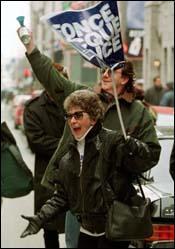GP chief continues attack on Schumacher; Protesters denounce anti-tobacco law
©
Tuesday March 4, 1997
Ron Walker, the Australian Grand Prix chief, continues to attack Schumacher
on his remarks on the 'not very demanding' Albert Park track.
He again stated: "I expect better form from a sportsman of Schumacher's
calibre, who I believe earns in excess of $(U.S.) 30 million a year, than
to blame our world-class circuit with six passing spots - more than most
tracks in the world. He doesn't have the right to make these remarks."
FIA boss Bernie Ecclestone said in London that Schumacher had been:
"talking a load of rubbish. It's probably the safest track in the world.
He's talking complete nonsense...If he personally doesn't like it, he
should go home."
Jackie Stewart said: "Racing drivers are highly-strung. They are a
different animal to the rest of us."
Protesters denounce anti-tobacco law
|
MONTREAL (CP) -- Hundreds of protesters -- smokers and non-smokers -- jammed Montreal's downtown Tuesday to demand that Health Minister David Dingwall butt out of their lives.
Dingwall's bill, limiting the sponsorship of sports and cultural events by tobacco firms, would endanger major Montreal events and cost too many jobs, the protesters argued.
Cars and trucks honked their horns in sympathy as the high-spirited crowd cheered protest leaders and booed loudly any mention of Dingwall or Prime Minister Jean Chretien.
Restaurant owner Alain Creton organized the lunchtime protest by inviting fellow core-area business people to shut down for 15 minutes. It was only a partial success: many merchants remained open because they couldn't afford to lose a peak period.
Creton said youngsters don't take up smoking just because they watch the du Maurier Ltd. Canadian Open tennis tournament or see a Rothmans logo on auto racer Jacques Villeneuve's jersey.
Montreal businessman Gary Sommerville said the federal legislation would also threaten major racing events in such cities as Toronto, Vancouver and Trois-Rivieres, Que. |

Protesters take to the downtown streets of Montreal
Photo by Shaun Best (REUTERS):
courtesy of LiZER Motorsports International
|
"We have a government that is doing everything to crush business," said Sommerville. "If business doesn't have the volume to be able to pay taxes, what are we going to do?"
Creton said events like the jazz festival -- which gets 12 per cent of its funds from du Maurier -- create jobs.
"If we don't have jobs, our children can't eat," said Creton, adding that Chretien cannot forget Quebec if he wants to win the next election.
"I know he has lots of support in Ontario but people in Toronto will get fed up too. They've got the Indy car. They're threatened in Ontario too but they haven't woke up yet."
Clement Godbout, president of the Quebec Federation of Labor, called the law a limit on individual rights.
"It's true there are related health problems. But you can't use health, or simply a political strategy, to systematically assassinate Montreal's economy, which is already very sick."
The protest drew support from Gerald Lacoste, head of the Montreal Exchange. In a statement, Lacoste said the stock exchange has used big sporting events to boost the city's profile. The loss of the Grand Prix and du Maurier Open would be "disastrous for Montreal".
Some neighborhood businessmen echoed the concern about the planned law's impact on tourism and their own income.
"Tourism is about 50 per cent of our retail business," said Michel Kadosh, who runs a men's wear shop. He said during the jazz and other summer festivals, "the whole city is revived."
Restaurant manager Jim Tzemopoulos said, "The bottom line is, it's bringing money into the whole city."
Courtesy of LiZER Motorsports International, Canada
[ Previous | News Index |
Next ]
